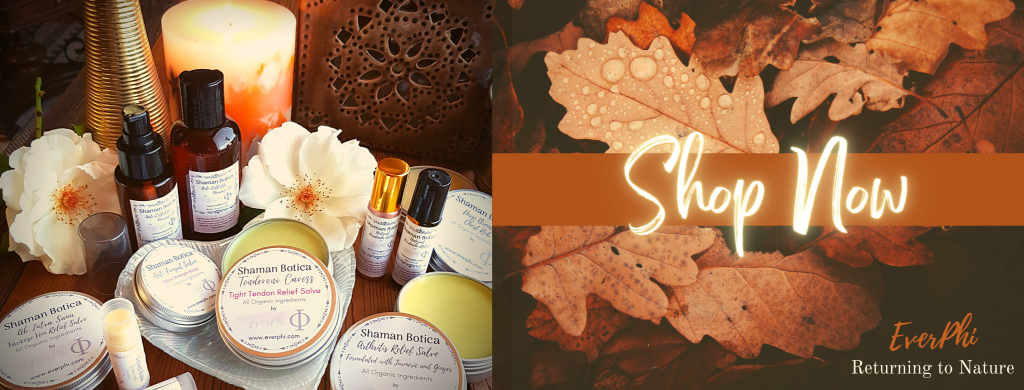
Oregano essential oil is a pale yellow to pale grey-green substance obtained by steam distillation of the Origanum Vulgare plant.
It has a thin consistency and a middle perfume note, which is sharp, warm, spicy-herbaceous, and camphoraceous.
Origanum vulgare of the labiatae family, is a spice and tea that is commonly known as oregano.
The essential oil of oregano blends well with peppermint, eucalyptus, lavender, chamomile, basil, rosemary, bergamot, cypress, cinnamon, clove, orange, sandalwood, cedarwood, and tea tree essential oils.
Origanum Vulgare is a flowering plant in the mint family, Lamiaceae. It is native to temperate Western and Southwestern Eurasia and the Mediterranean region.
Oregano is related to the herb marjoram, sometimes being referred to as wild marjoram.
The plant has tiny, pinkish-purple or white flowers and spade-shaped, olive-green leaves. It is a perennial, although it is grown as an annual in colder climates, as it often does not survive the winter.
Oregano is planted in early spring, the plants being spaced 30 cm (12 in) apart in fairly dry soil, with full sun. It prefers a hot, relatively dry climate, but does well in other environments too.
Traditionally, it is used as a medicinal carminative and stomachic, taken with meals to reduce gastrointestinal distress. Sometimes is also consumed as a tea, for diuretic and emmenagogue purposes.
Other indications include analgesia and anti-inflammation, such as for chronic rheumatism, toothache, and earache.
Oregano is an herb that has been cultivated for centuries in the Mediterranean region, although now it can be found in most continents.
The name oregano translates roughly into ‘‘mountain joy’’, which explains in part its association for ancient Greeks and Romans with joy and happiness. Actually there is not simply one ‘‘oregano’’, but rather several species that may contribute to the oregano used for culinary purposes.
The oil of oregano can be used in food production due to its antioxidant properties (preserving fatty acids from spoiling over time during storage) and its antimicrobial properties, since the oil seems to be able to suppress the growth and destroy the common food-borne microbes that cause illness.
Medicinal uses for oregano date back to the ancient Greek and Roman empires where applications of the leaves were used to treat skin sores, to relieve aching muscles, and as an antiseptic.
Oregano also has been used in traditional medicines for such ailments as asthma, cramping, diarrhea, and indigestion.
In Greece, an oregano infusion is still used as a folk remedy against colds and an upset stomach. and to maintain general health.
Because there are so many species of Origanum used around the world as an ‘‘oregano’’ condiment and for medicinal purposes, it is not surprising that there are variations in their profiles of bioactive constituents and in the related beneficial effects.
For example, the carvacrol content of essential oils from Origanum plants may vary over 20-fold, and similarly thymol content may vary 3-fold to almost 30-fold among plant oils.
On the other hand, the amounts of terpene alcohol linalool could range from nondetectable in one plant oil, to approximately 30% of the essential oil composition in another.
The volatile compounds carvacrol and thymol are considered major terpene components of oregano essential oils, along with p-cymene and +-terpinene, which are precursors in the biosynthesis of thymol and carvacrol.
Thymol is used in perfumes and mouthwashes.
Other bioactive compounds identified in oregano leaf include phenolic acids (caffeic acid, p-coumaric acid), rosmarinic acid and caffeoyl derivatives, ursolic acid, and carnosic acid, as well as a mixture of flavonoids.
In fact, rosmarinic acid is one of the most abundant phenolic compounds present in aqueous extracts of oregano leaf and is known to be the dominant phenolic compound in Labiatae spices (such as oregano, rosemary, sage, etc).
However, in general, Carvacrol is the major component (characteristic odor of oregano). Then, Thymol, β-fenchyl alcohol, δ-terpineol, γ-terpinene, α-terpinene, 1-methyl (1-methylethyl) and benzene.
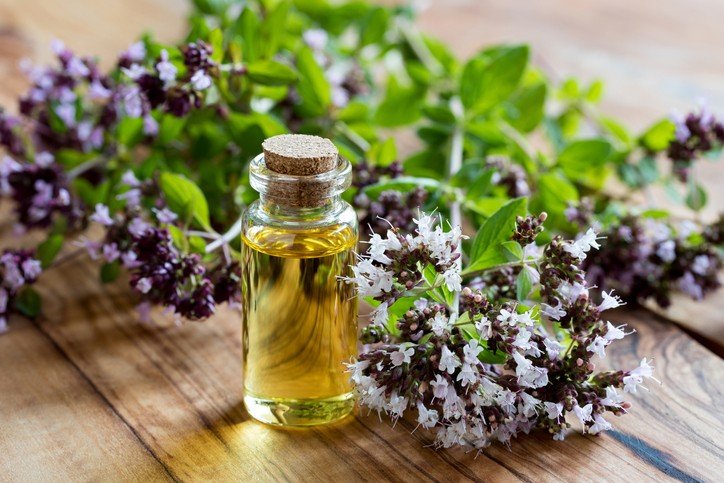
Essential oils of oregano are widely recognized for their antimicrobial activity, as well as their antiviral and antifungal properties.
Nevertheless, recent investigations have demonstrated that these compounds are also potent antioxidant, anti-inflammatory, antidiabetic and cancer suppressor agents.
Its anti-proliferative, anti-genotoxic (reduce the chromosomal aberration in bone marrow cells of rats), cytotoxic (inhibit cell viability of human breast and prostate cancer cell lines), anti-angiogenic, hypoglycemic and antitumor properties, need more research.
Oregano oil constituents are reported in vitro models to suppress microbes that cause food spoilage, and those that contribute to human and animal disease.
Both, the essential oil and other extracts of oregano can suppress the growth of gram-positive and gram-negative bacteria, yeast, and some fungi.
In a short-term study in humans infested with enteric parasites, daily intake of 600 mg. of emulsified oregano oil resulted in noticeable decreases in occurrence of some parasites.
Individual components of oregano essential oil, such as carvacrol and thymol, also have antimicrobial actions. Observations shown that oregano oil phytochemicals can suppress microorganisms associated with oral disease and ear infections.
Although the antiviral efficacy of spice phytochemicals can vary, rosmarinic acid was reported to reduce the mortality of mice infected with an encephalitis virus, and has been identified as an inhibitor of HIVE type 1.
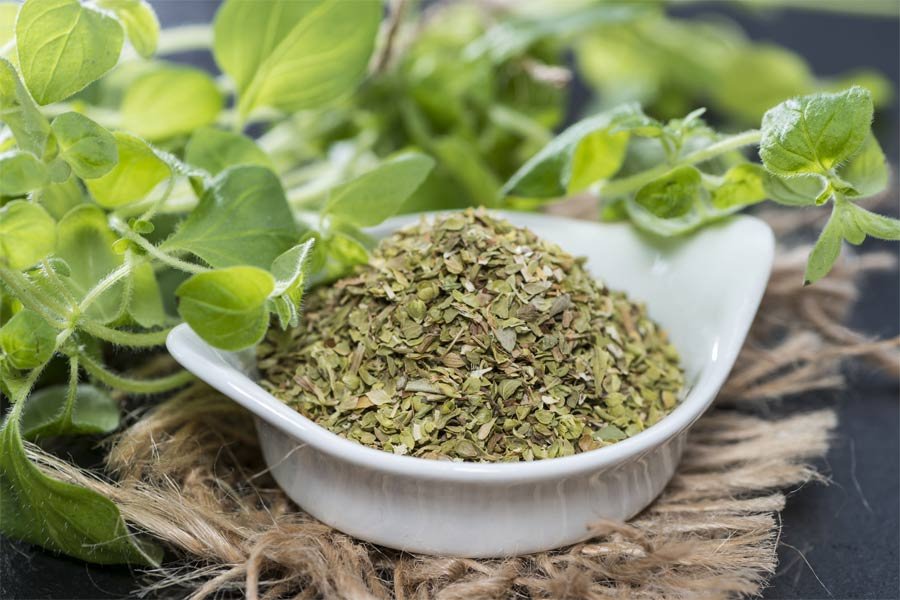
Inflammation is a normal biological response of the body to tissue damage, infections and chemical or physical agents.
Several investigators have provided evidence that oregano extracts or constituents thereof can suppress inflammation, in vitro and in vivo.
Thymol inhibited the release of elastase (a marker of inflammatory disease) from human neutrophils induced by a chemotactic peptide. An action in part, mediated through inactivation of calcium-channel machinery.
Likewise, rosmarinic acid inhibited neutrophil elastase release and weakly suppressed thrombin activity.
On the other hand, rosmarinic acid induced apoptosis of lymphocytes, and was able to kill T and natural killer cells, which are means by which harmful immune responses can be mitigated.
Oregano essential oil, administered intra-rectally or in the diet, had a significant protective effect in rodents against chemically induced colonic damage, inflammatory cell infiltration, and vascular dilation; along with suppressing production of pro-inflammatory cytokines IL-1″ and IL-6.
In several mouse studies of inflammation, rosmarinic acid dramatically decreased inflammatory autoimmunoarthritis and allergic asthma, and markedly reduced inflammatory markers and cyclooxygenase 2 expression.
Besides, in human patients with seasonal allergic rhinoconjunctivitis who were treated with rosmarinic acid, there was a significant decrease in the symptoms, compared with controls.
In activated T cells obtained from patients with rheumatoid arthritis, rosmarinic acid induced apoptosis, which was suggested by the authors as a potential strategy to inhibit pathogenic T cell mediated progression of rheumatoid arthritis.
In one study, oregano essential oil had the highest total antioxidant capacity and phenolic content compared with 5 other herbs from Labiatae family: thyme, sage, rosemary, mint, and sweet basil.
Oregano extracts have demonstrated radical scavenging action, suppression of lipid peroxidation, inhibition of nitric oxide activity, and protection of DNA against H2O2-induced oxidant damage.
Consequently, many studies have positively correlated oxidative stress with the pathogenesis of diseases, such as Alzheimer’s disease, Parkinson’s disease, chronic-inflammation, arthritis, some types of cancer, diabetes and atherosclerosis, among others.
The constituents reported to be responsible for the antioxidant strength of oregano have been variously attributed to carvacrol, +-terpinene, rosmarinic acid, ursolic acid, protocatechuate-glycosides, and thymol.
Oregano also contains homologs of the nutrient antioxidant tocopherol. In rats, oregano or constituents (42.5 mg/kg body weight) increased aging brain antioxidant activity and total antioxidant status.
However, because of variability in composition and origin of different Origanum specimens, the antioxidant capacity reported can vary substantially.
Oregano and some constituents such as carvacrol, thymol, and +-terpinene have been reported in preliminary studies to influence nervous system chemistry and diverse functions, including responses to olfactory stimulation.
Intriguing evidence from animal studies suggests that rosmarinic acid produces antidepressive activity, and may inhibit an emotional abnormality produced by stress.
There is limited evidence that oregano oil have the potential to benefit the management of diabetes and cardiovascular disease. For example, water extracts of oregano and rosmarinic acid exhibited considerable glucosidase inhibitory activity in vitro.
Rosmarinic acid containing oregano extracts also inhibited porcine pancreatic amylase activity. In 2 animal studies using diabetic rats, a water extract of Origanum vulgare administered orally at 20 mg/kg body weight, demonstrated antihyperglycemic activity.
In several assay systems, extracts of Origanum oil specimens and individual constituents such as +-terpinene and carvacrol, have been shown to inhibit blood platelet aggregation and adhesion, decrease cholesterol biosynthesis, and reduce serum total cholesterol and triglyceride levels.
Additionally, in cockerels, dietary supplementation with thymol and carvacrol suppressed serum cholesterol levels, which in part could be due to increased activity of geranyl pyrophosphate pyrophosphatase.
Oregano essential oil compound rosmarinic acid, or carvacrol has been shown to protect liver cells in rodents from lead toxicity and to stimulate liver regeneration following partial hepatectomy.
Carvacrol also protected rat liver from defects caused by ischemia and reperfusion, without being hepatotoxic.
Cardiovascular diseases (CVD) are the major cause of death in several countries and are increasing worldwide. CVD is a chronic inflammatory condition that is accelerated by various factors such as smoking, diabetes and inflammation.
The major cause of CVD is atherosclerosis, which is the result of an abnormal inflammatory response; as some pro-inflammatory cytokines (IL-1β and TNF-α) are involved in the process of leukocyte adherence.
Research on the effects on anti-CVDs of essential oils have focused on its individual components such as carvacrol, thymol, eugenol, and γ-terpinene from several sources.
Among the most notorious studies reported to date, anti-inflammatory properties of different species of oregano have been informed. Nonetheless, given the relationship between inflammation and the development of CVD, this could be a way in which oregano essential oil may exert an indirect cardio-protective effect; yet there is a lack of studies and therefore the precise mechanism in which this occur is still not fully known.
A study used oxidized-LDLs activated THP-1 macrophages treated with oregano essential oil from Origanum vulgare, which main compounds were sabinene hydrate, thymol and carvacrol.
The authors reported a decrease in the synthesis of pro-inflammatory TNF-α, IL-1β and IL-6 cytokines, as well as an increase in the production of anti-inflammatory cytokine IL-10.
These results are important because it shows that oregano essential oil may be used in novel treatments of inflammation-related chronic diseases such as atherosclerosis.
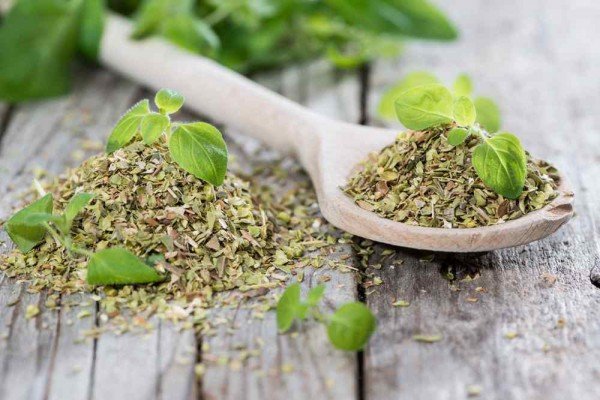
Hypertension is the most common chronic disease and a major risk factor for morbidity and mortality.
Among the various factors associated in the pathophysiology of hypertension are the alterations in cellular cations, such as sodium (Na+), calcium (Ca2+), potassium (K+) and magnesium (Mg2+), all of which are known to increase systolic blood pressure.
However, studies suggest the possible anti-hypertensive properties, of essential oils compound such as carvacrol by acting as hypotensive agents, due to the vasodilatation that involves, the inhibition of the Ca+2 influx through Cav and TRP channels.
In normotensive rats, administration of carvacrol decreased systolic and diastolic blood pressures. It is important to mention that the mode of action of oregano essential oil on their effect on cardiovascular health is not fully known due to the lack of studies.
Therefore, in this regard, TRP channels are a superfamily of receptors that have been suggested to be involved in the development of cardiac hypertrophy, heart failure, cardiac arrhythmias, vascular remodeling and pulmonary hypertension.
Obesity and metabolic syndrome are life-threatening events that lead to growing health issues worldwide. Obesity is the central and causal component in metabolic syndromes, resulting from an imbalance between energy intake and energy expenditure that can cause impaired glucose tolerance, insulin resistance, and type 2 diabetes.
In particular, metabolic syndrome is defined by the International Diabetes Federation as a cluster of the most dangerous heart attack risk factors: diabetes and raised fasting plasma glucose, abdominal obesity, high cholesterol and high blood pressure.
The anti-diabetic properties of oregano essential oil have been related to the main components such as carvacrol and thymol; in this sense, some studies on plants belonging to the Lamiaceae family, suggest that the mode of action of essential oils may vary depending on that composition.
A recent research, showed that the essential oils from two species of oregano (O. vulgare subsp. vulgare and subsp. hirtum) possess α-amylase and α-glucosidase inhibitory activity. Interestingly, the major compounds identified in these species were thymol, carvacrol, p-cymene, γ-terpinene, and linalool.
Similarly, other study reported the inhibition of the amylase by oils of Origanum vulgare, and that when combined with rosmarinic acid, the inhibition was higher. Therefore, suggesting that the combination of phenolic compounds with oregano essential oil may contribute to additional amylase inhibitory activity.
Essential oil constituents could exert antiproliferative effect. Different mechanisms such antioxidant, antimutagenic, antiproliferative, among others, are responsible for their chemopreventive properties.
The antiproliferative effects of essential oils, have been demonstrated in diverse cancer cell models through several pathways.
A study showed the anti-proliferative activity of essential oils of Origanum species. At 100 μg/mL concentration, oils derived from Origanum dictamnus showed the most interesting biological activity with an inhibition on colon carcinoma cells.
Additionally, in the same study, it was reported that the oils from Origanum dictamnus and Origanum libanoticum, had an anti-proliferative activity in hepatocarcinoma cells.
Other investigation showed that essential oils from Origanum vulgare inhibit cell proliferation in human breast adenocarcinoma, and human colon adenocarcinoma cells.
However, an increase in oregano essential oil concentration did not increase the cell growth inhibition.
The authors implied that the effect could be attributed to the main components (terpinen-4-ol, thymol, γ-terpinene and carvacrol).
Besides, essential oils of Origanum hirtum, significantly reduced the proliferation of human lung adenocarcinoma epithelial cells line, after 24 hours incubation, compared with untreated control cells.
Furthermore, it was suggested that the oregano essential oil modifies the onset of mitosis, possibly prior to the G2 phase and prophase.
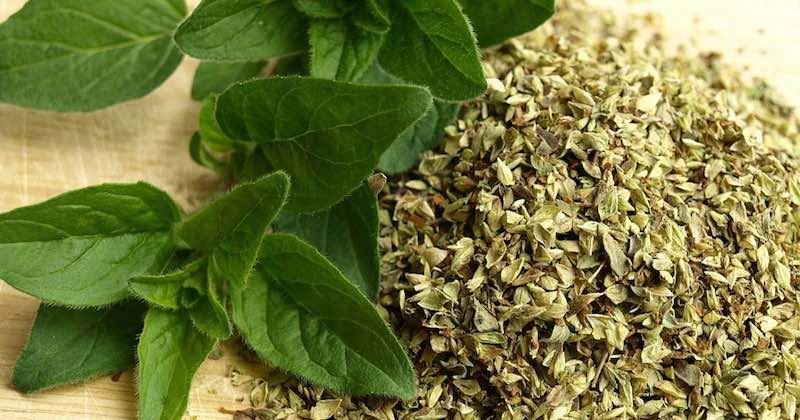
Many evidences have shown that oregano essential oil had antitumor effect. It have shown antitumor activity both in in vivo and in vitro assays.
An in vivo study reported that low doses of oregano essential oil in a three-month period exerted preventive action by decreasing the sizes of tumors by 1.5 times in diseased animals.
It was suggested that oregano oil could possible affect the development and progression of the tumor process via the activation of regulator cell molecules.
The in vitro antitumor activity of essential oils of Origanum onites, was analyzed against rat adipose tissue, endothelial cells and c-H-ras transformed rat embryonic fibroblasts cells.
On the other hand, oregano oil have shown activity against genotoxic agents, which are capable of altering DNA, and thereby, causing cancer or mutation.
This activity could be attributed in part to the essential oil composition and its antioxidant capacity.
Furthermore, in human breast and prostate cancer cell lines, essential oils of majorana and Oregano showed an inhibitory effect on cancer cell viability in a range of 79–88% at 0.5 mg/mL (24 hrs.). However, Origanum majorana was more cytotoxic than Origanum vulgare against the cancer cells.
Besides, essential oils from oregano have been proposed as dietary inhibitors of mutagenesis and carcinogenesis.
Nonetheless, investigations about anticarcinogenic effect of oregano essential oil are still scarce.
As usual, good quality oils, that is, 100% pure and not mixed with other substances, can be found in specialized natural herb stores.
If you can not reach a trusted naturist or herbalist shop near you, here are some recommendations:
Oregano Essential Oil
Scent Characteristics:Warm, herbaceous and slightly spicy scent.
Our 100% Pure Essential Oils are extracted from the root, bark, wood, seed, fruit, leaf, or flower of a freshly harvested plant.
We source only the finest quality essential oils from highly regarded suppliers and distillers from around the world, many with whom we’ve worked with for decades.
Many of our oils are steam-distilled or cold-pressed, therefore retaining the essential odor, aroma, taste, medicinal, and therapeutic properties of the plant, resulting in a superior quality, and highly concentrated essence. Shop here.